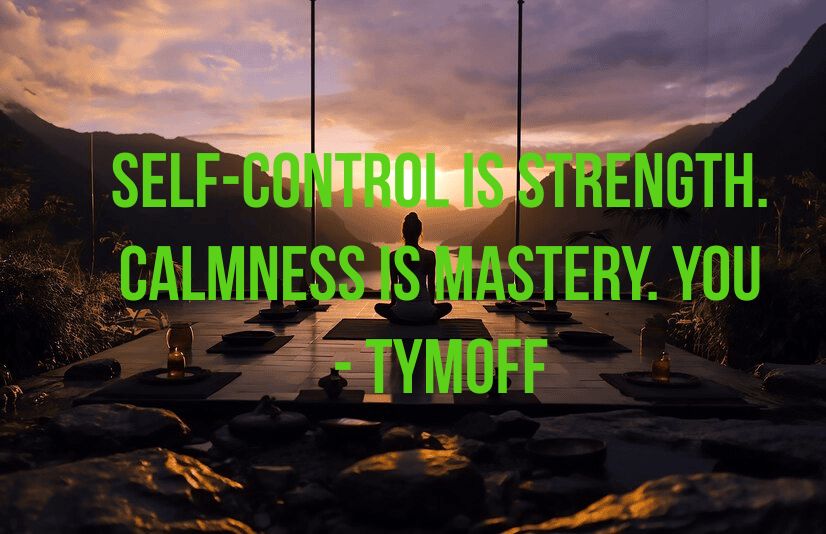In the journey of personal development, the principles of self-control and calmness stand as pillars of strength and mastery. Understanding the symbiotic relationship between these qualities is essential for navigating life’s challenges with resilience and grace. In this comprehensive guide, we delve into the profound impact of self-control is strength. calmness is mastery. you – tymoff, offering insights, strategies, and practical tips to cultivate these attributes in your life.
1. Understanding Self-Control
The Importance of Self-Discipline
Self-control, often synonymous with self-discipline, is the ability to regulate one’s emotions, thoughts, and behaviors in the pursuit of long-term goals. It serves as the foundation for success in various aspects of life, including personal relationships, career advancement, and overall well-being.
Resisting Temptations and Impulses
One of the hallmarks of self-control is the capacity to resist immediate gratification in favor of delayed rewards. By exerting control over impulses and temptations, individuals can make decisions aligned with their values and aspirations, leading to greater fulfillment and satisfaction. This ability not only fosters a sense of accomplishment but also cultivates resilience in the face of adversity, ultimately contributing to personal growth and success.
Overcoming Procrastination
Procrastination, a common challenge faced by many, can be effectively overcome through enhanced self-control. By cultivating habits of time management and prioritization, individuals can tackle tasks efficiently and stay focused on their objectives, fostering productivity and achievement.
Building Healthy Habits
Self-control plays a pivotal role in establishing and maintaining healthy habits, such as regular exercise, balanced nutrition, and adequate sleep. By exerting discipline over lifestyle choices, individuals can enhance their physical and mental well-being, paving the way for a more vibrant and fulfilling life.
2. Mastering Calmness
Embracing Emotional Stability
Calmness, or emotional stability, is the ability to maintain composure and tranquility in the face of adversity or stress. Cultivating this quality enables individuals to navigate life’s ups and downs with resilience and equanimity, fostering inner peace and mental clarity. This inner tranquility acts as a shield against the storms of life, allowing individuals to approach challenges with a sense of serenity and confidence.
Practicing Mindfulness
Mindfulness, the practice of being present and attentive to the present moment, is a powerful tool for cultivating calmness. By engaging in mindfulness exercises such as meditation and deep breathing, individuals can reduce stress, anxiety, and overwhelm, fostering a sense of inner peace and balance.
Responding vs. Reacting
Mastering calmness involves shifting from reactive to responsive modes of behavior. Rather than impulsively reacting to external stimuli, individuals can choose deliberate and thoughtful responses, empowering themselves to navigate challenges with wisdom and grace.
Finding Serenity in Chaos
In today’s fast-paced world, finding moments of serenity amidst chaos is essential for well-being. Cultivating calmness allows individuals to remain centered and grounded, even in the midst of hectic schedules and demands, fostering a sense of balance and harmony in life. This inner tranquility serves as a guiding light, enabling individuals to navigate challenges with clarity and grace, enhancing overall resilience and fulfillment.
3. The Synergy of Self-Control and Calmness
Harnessing Inner Strength
The synergy of self-control and calmness amplifies one’s inner strength and resilience, fostering a profound sense of empowerment. By integrating these qualities into daily life, individuals can navigate challenges with confidence and clarity, unlocking their full potential for growth, fulfillment, and lasting success.
Cultivating Emotional Intelligence
Self-control and calmness are integral components of emotional intelligence, the ability to recognize, understand, and manage emotions effectively. By honing these skills, individuals can cultivate healthier relationships, make sound decisions, and thrive in diverse personal and professional contexts.
Achieving Peak Performance
Individuals who master self-control and calmness often experience enhanced performance and productivity in various areas of life. By harnessing their inner resources and maintaining a sense of equanimity, they can achieve peak performance and excel in their endeavors. This heightened state of self-mastery enables individuals to navigate challenges with confidence, make informed decisions, and foster positive relationships, ultimately leading to greater fulfillment and success.
Nurturing Personal Growth
Ultimately, the journey of self-control and calmness is a path of continuous growth and evolution. By embracing these principles and integrating them into daily life, individuals can cultivate a deeper sense of self-awareness, fulfillment, and purpose, unlocking new possibilities for personal and professional success.
Self-Control is Strength. Calmness is Mastery. You – Tymoff
In conclusion, self-control is indeed the bedrock of strength, while calmness represents the pinnacle of mastery. Embracing these principles isn’t just a choice; it’s a commitment to personal empowerment. As you integrate these qualities into your life, you’ll find yourself equipped to surmount obstacles, capitalize on opportunities, and navigate life’s journey with purpose and fulfillment. Always remember, every step taken towards personal growth is a testament to your evolving self-awareness, resilience, and transformative potential.
FAQs
- How can I improve my self-control? Practicing self-awareness, setting clear goals, and developing healthy habits can help improve self-control over time.
- What are some effective strategies for cultivating calmness? Mindfulness meditation, deep breathing exercises, and practicing gratitude are effective strategies for cultivating calmness and emotional stability.
- How do self-control and calmness contribute to success? Self-control enables individuals to stay focused on long-term goals, while calmness equips them to navigate challenges with resilience and clarity, ultimately leading to greater success.
- Can self-control and calmness be learned? Yes, self-control and calmness are skills that can be cultivated through practice, patience, and self-awareness.
- What role does self-control play in managing stress? Self-control allows individuals to manage stress more effectively by regulating their reactions and implementing coping strategies to alleviate tension.
- How does cultivating calmness benefit mental health? Cultivating calmness promotes mental well-being by reducing stress, anxiety, and negative emotions, fostering greater clarity of mind and emotional resilience.



